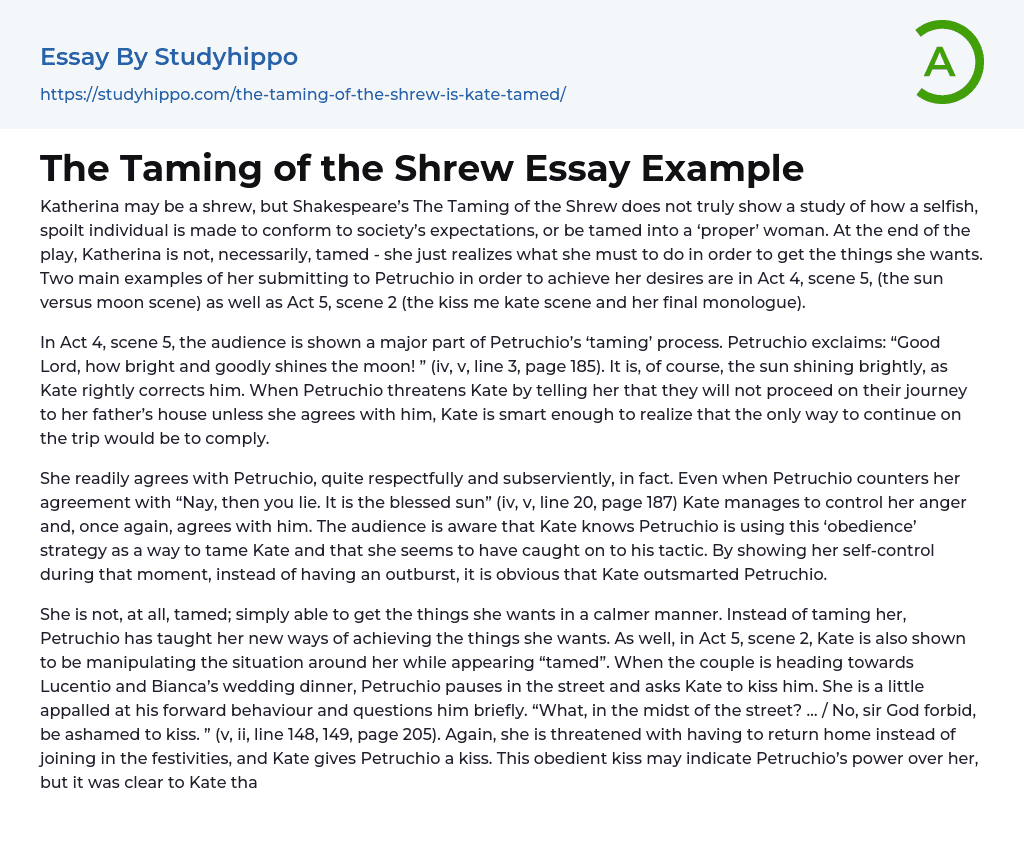Katherina may be a shrew, but in Shakespeare's The Taming of the Shrew, her transformation into a "proper" woman is not fully depicted. Instead, the play acknowledges that Katherina learns to adapt to society's expectations in order to attain her desires. Two significant instances where she submits to Petruchio are in Act 4, scene 5 (the sun versus moon scene) and Act 5, scene 2 (the "kiss me kate" scene and her final monologue).
In Act 4, scene 5 of the play, Petruchio's 'taming' process is highlighted. Petruchio expresses his admiration for the moon, saying "Good Lord, how bright and goodly shines the moon!" (iv, v, line 3, page 185). However, Kate corrects him, pointing out that it is actually the sun shining brightly. When Petruchio threatens Kate, stating that they will not continue their journey to her father
...'s house unless she agrees with him, Kate realizes that she must comply in order to proceed.
Kate readily agrees with Petruchio, respectfully and subserviently. Even when Petruchio counters her agreement with “Nay, then you lie. It is the blessed sun” (iv, v, line 20, page 187), Kate manages to control her anger and once again agrees with him. The audience is aware that Kate knows Petruchio is using this ‘obedience’ strategy to tame her and she seems to have caught on to his tactic. By showing self-control instead of having an outburst during that moment, it is clear that Kate has outsmarted Petruchio.
She is not tamed, but rather capable of achieving her desires in a more composed manner. Instead of taming her, Petruchio has taught her new strategies for obtaining what sh
wants. Additionally, in Act 5, scene 2, Kate is seen manipulating the situation around her while appearing subdued. As they are on their way to Lucentio and Bianca’s wedding dinner, Petruchio stops in the street and asks Kate for a kiss. She is somewhat shocked by his bold behavior and briefly questions him, stating "What, in the midst of the street? ... / No, sir God forbid, be ashamed to kiss" (v, ii, line 148, 149, page 205). Once again, she faces the threat of being sent home instead of participating in the celebrations, so Kate gives Petruchio a kiss. This compliant kiss may demonstrate Petruchio’s control over her, yet Kate realizes that if she refuses to give him the requested kiss, she will be denied entry to the wedding feast. Kate is intelligent and crafty; she manipulates his desire for her docility in order to do everything she wants while also keeping him happy and pleased.
In addition, Kate's final monologue in Act 5, scene 2 provides important insight into both the play and society in Shakespeare's era. At first glance, Kate's final monologue may appear to be a lengthy lecture on the importance of unquestioningly serving one's husband. "Then vail your stomachs, for it is no boot, / And place your hands below your husband’s foot" (v, ii, lines 92-3, page 221). However, Shakespeare's decision to give Kate the last word in the play demonstrates her consistent power and control.
The monologue from Kate can also be seen as ironic since she is aware of society's expectations for women in the household and the role Petruchio wants her to fulfill.
Throughout the play, she plays the part expected of her in front of a large audience, appearing "truly tamed" or incredibly clever. By teaching Bianca and the widow how to properly treat their husbands, she is considered tamed herself. She has now improved her reputation. Nonetheless, in The Taming of the Shrew, Kate does not fully transform into the Elizabethan wife Petruchio and others believe she becomes. Instead, she learns to manipulate situations to achieve her desires without resorting to outbursts and a sour attitude. This Shakespearean comedy mocks society's expectations by showcasing how Kate, a powerful woman, outwits her arrogant husband Petruchio. Katherina:
- A Doll's House essays
- A Midsummer Night's Dream essays
- A raisin in the sun essays
- A Streetcar Named Desire essays
- An Inspector Calls essays
- Death of a salesman essays
- Everyman essays
- Fences essays
- Hamlet essays
- Hedda Gabler essays
- Iago essays
- King Lear essays
- Macbeth essays
- Much ado about nothing essays
- Oedipus Rex essays
- Oedipus The King essays
- Othello essays
- Pygmalion essays
- Romeo And Juliet essays
- Tartuffe essays
- The glass menagerie essays
- The Importance of Being Earnest essays
- The Merchant Of Venice essays
- The Taming of The Shrew essays
- Twelfth Night essays
- Waiting For Godot essays




